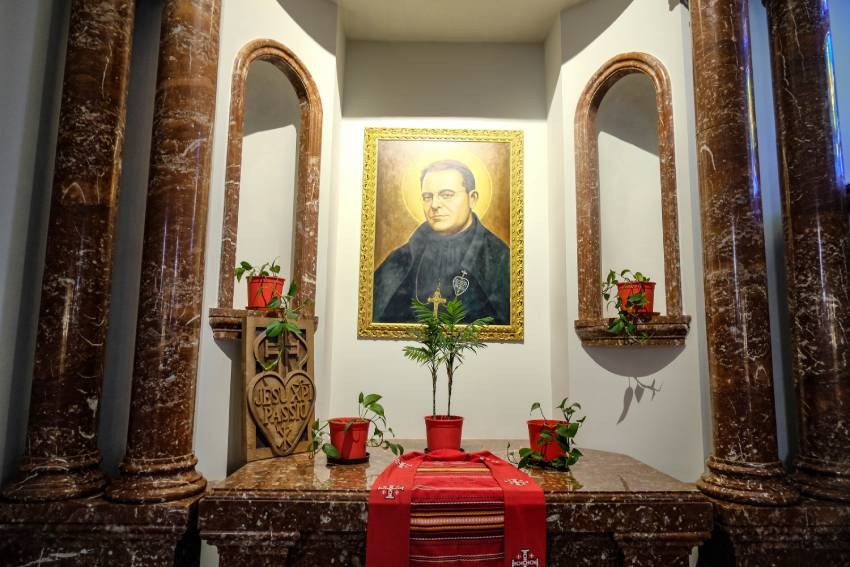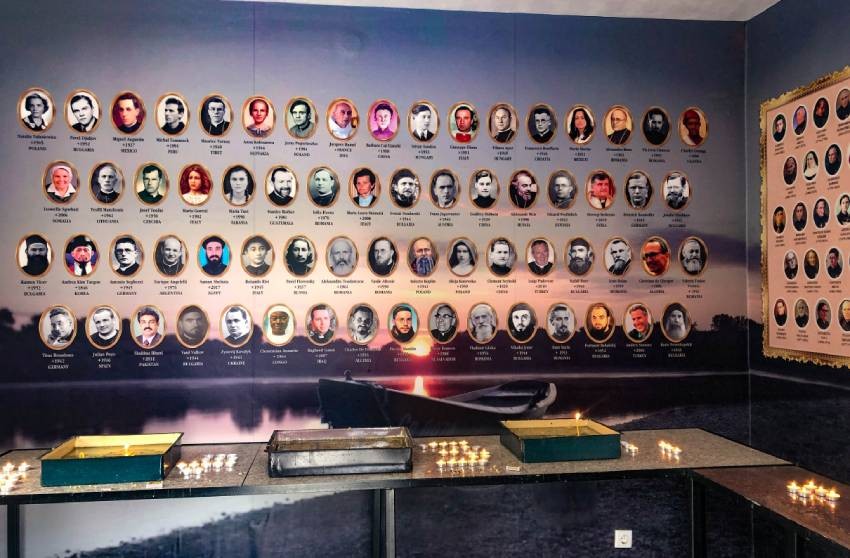Belene is a small town on the Bulgarian bank of the Danube, associated by most Bulgarians with the concentration camp on the island of Persin, where without trial or sentence, people labeled as enemies of the communist regime were imprisoned and tortured. For the Catholic communities, the city is a holy place because Bishop Eugene Bosilkov was born and baptized here. He was later executed by the communists in a sham trial in 1952. Bosilkov was declared “Blessed” by Pope John Paul II. There is a monument to the Pope in the city, as well as a dedicated sanctuary with a part of the relics of Bishop Bosilkov in the local church "Nativity of the Blessed Virgin Mary", which attracts believers from the country and abroad.
Nowadays, the church is the soul and heart of the Catholic communities in northern Bulgaria, thanks to priest Paolo Cortesi. He is Italian, originally from Bergamo. Before he arrived to Bulgaria, he served as an assistant parish priest in Milan. He came to Belene in the autumn of 2010. He learned Bulgarian with ease and very quickly managed to win the trust and love of the local people. “I've been here for 12 years and I can receive dual citizenship!” Paolo Cortesi says with a smile. He gladly welcomes visitors to the church. From him we learn that it was built back in 1860 on the foundations of an older church, which was constructed with stones from the nearby Roman fortress.

"Northern Bulgaria is the place with the largest community, professing the Christian faith according to the Western model, i.e. Catholicism," Paolo Cortesi says and adds:
"The city of Rakovski is to the south and it is also a nest of Catholicism. Here in the northern regions, this is Belene and some villages around Belene. The foundations were laid in 1605 - 1606, when Franciscan missionaries arrived from Chiprovtsi, Byala Slatina and Montana. They baptized the local people as Catholics. For 400 years the largest Catholic community in Bulgaria has been living here. There are about 2,000-3,000 people just in Belene. In the nearby village of Oresh, all are Catholics, about a thousand people. There are Catholic communities in the villages of Malchika, Dragomirovo, Tranchovitsa; in the entire area around Belene. The city is on the bank of the Danube and it is very old. For centuries, the Catholics have been living in the eastern part of Belene, while the Orthodox have been living in the western part. It turns out that those who live in western Belene are Eastern Orthodox Christians, and those in the eastern part are Western Catholics," Paolo Cortesi says.
However, there are also mixed marriages in Belene. "Brides were baptized in the Orthodox faith in order to enter into such a marriage," Father Cortesi adds.

There are three churches in the city - two Catholic and one Orthodox. To this day, the two communities celebrate Palm Sunday and Easter twice in the spring and dye eggs together. Unlike most Orthodox churches, the Catholic church in Belene is always open to outside visitors.
A few years ago, Father Cortesi put a lot of efforts into building a Memorial Park on the site of the former concentration camp on Persin Island. But the project was frozen due to political disagreements. In "Nativity of the Blessed Virgin Mary", however, there is a special place dedicated to the victims of communism. At the entrance to the church there is a chapel to the martyrs of the XX-XXI centuries, killed for their faith:

“Here, in the candlelit chapel, we have put up these posters of martyrs from recent years. Catholics, Orthodox, Armenians, Protestants - these are Christian martyrs from all over the world. It is not only communists who killed people. Unfortunately, we have many martyrs everywhere. In recent years some were killed by the jihadists in Turkey, Syria, Egypt; we also have martyrs from South America," priest Paolo Cortesi says in conclusion.
See also: Memories from Bardarski Geran documentary: the possible different scenario of Bulgaria's history
English: Al. Markov
Photos: Veneta Nikolova
The book "Icons from the National Church Historical and Archaeological Museum" - a huge work of over 500 pages, with more than 700 published photographs and accompanying scientific articles, was officially presented a few days ago. The unique..
A humble military chaplain made his first contact with Bulgaria in 1921, arriving with the mission of searching for Italian soldiers who had disappeared without a trace during World War I. However, he did not remain indifferent to the fate of this small..
Beloslav is a small town on one of the branches of Varna Lake. Yet it is here, in this quiet little town, that the only preserved Bulgarian submarine – Slava – is anchored . It was decommissioned a long time ago, and has now been turned in one of..

+359 2 9336 661
